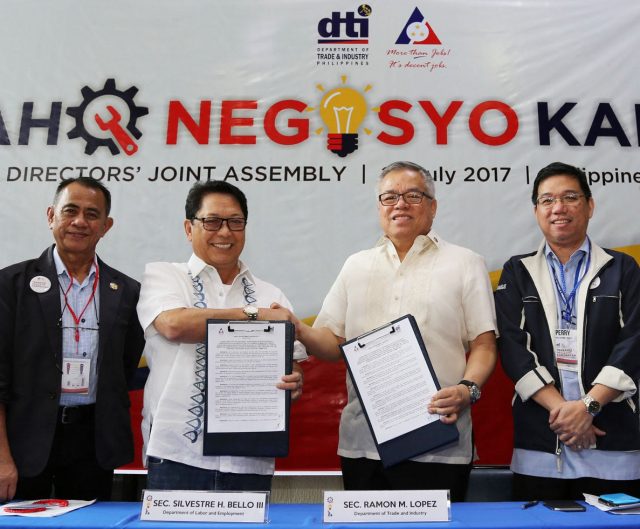
MANILA – With an eye to boosting compliance of Philippine garments firms with international labor standards, the Department of Trade and Industry-Board of Investments and the Department of Labor and Employment signed Tuesday (July 25) a Joint Department Order embodying guidelines for the issuance, suspension or revocation of certificates of accreditation for garments firms.
These guidelines will cover garment manufacturers, exporters, and subcontractors who would want to avail of preferential tariffs under the Generalized System of Preferences (GSP). The Department Order also creates a Workers’ Rights Review Committee.
DTI Secretary and BOI Chairman Ramon Lopez and DOLE Secretary Silvestre H. Bello III signed the Joint DO during the DTI-DOLE Directors’ Joint Assembly for Trabaho, Negosyo, Kabuhayan (TMK) Tuesday at the Philippine Trade Training Center (PTTC) in Pasay City.
As part of the country’s commitment to comply with global labor standards for the garments and textile industries, the joint DO reflects a series of consultative meetings of the two agencies with the Clothing and Textile Industry Tripartite Council (CTITC), and labor and employment sectors since 2010.
“Despite the changing landscape of global trends, the production of goods and services must still conform to international labor standards for market access. This order will help promote labor laws compliance and standards in the garment industry via certification and decertification mechanisms for companies who want to avail preferential tariff under the GSP,” Lopez said.
Bello thanked DTI for supporting the DOLE’s initiatives. “The signing of the joint guidelines for the garments industry on the certification on labor standards compliance will ensure that are our workers have decent jobs, and that they enjoy the economic benefits that our participation in the global trade brings,” Bello said.
Under the Joint DO, the BOI will serve as the DTI Accreditation Board (DAB) that will grant Certificates of Accreditation mandatory for manufacturers, exporters and subcontractors availing tariffs under the Garments and Textile Import Services (GTIS) and voluntary for all other garment firms. The accreditation is mandatory for those availing of privileges under the GSP and voluntary for all other garment firms. The accreditation is valid for three years from issuance, but may be suspended or revoked due to failure to comply with the labor minimum standards set by the DAB.
BOI serves as the DAB. Import-related functions of the former Garments and Textile Import Services (GTIS)—including accreditation of importers—were transferred to the agency through DTI Department Administrative Order No. 10-06, Series of 2010.
In addition, the Workers’ Rights Review Committee—composed of four members representing DTI, DOLE, the labor sector and the employers sector—will conduct an audit of the applicant’s compliance with labor standards as provided under Section 8.1 of the Joint DO. Its audit findings and recommendations will be submitted to DAB for review and evaluation.
The Joint DO serves as the pilot guideline on the GSP availment. If such are deemed successful, the DTI and DOLE will come up with similar guidelines for other sectors and industries.









